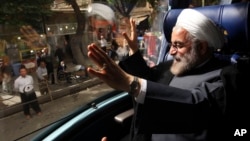Iran's next president, Hassan Rowhani, is a moderate cleric and former chief nuclear negotiator who has vowed to improve the nation's relationship with the international community.
Rowhani headed Iran's nuclear negotiating team from 2003 to 2005, under reformist president Mohammad Khatami. During that time, Rowhani oversaw a moratorium on uranium enrichment, which eased Western pressure over Iran's nuclear program -- kept secret until 2002.
In contrast to current President Mahmoud Ahmadinejad, the 64-year-old Rowhani has promised a less confrontational approach to world affairs, including talks on Iran's disputed nuclear program. Though he has said there will be "no surrender" to Western demands, he has vowed to pursue "constructive interaction with the world," including the lifting of international sanctions that have hammered the Iranian economy.
The only cleric of the six candidates in Friday's presidential election, Rowhani won the votes of reformists and moderates alike. He was helped in part by the earlier withdrawal of the only other moderate in the race -- Khatami's reformist first vice president, Mohammad Reza Aref.
Endorsements by Khatami and his moderate predecessor and Ahmadinejad rival, Akbar Hashemi Rafsanjani, also boosted Rowhani's candidacy. Their support and his promotion of policies such as more rights for women made him a favorite among those seeking change in the country.
Rowhani also maintains a close relationship with Iran's Supreme Leader Ayatollah Ali Khamenei, who has the final say in all major policy decisions.
Born in 1948 in the Iranian city of Sorkheh, Rowhani received his doctorate in law from Scotland's Glasgow Caledonian University.
Having begun religious studies as a teenager, he was a dedicated supporter of the founder of the Islamic republic, Ayatollah Ruhollah Khomeini, even before the 1979 revolution.
He served in the Iranian government for decades after that -- as a member of parliament from 1980 to 2000 and Secretary of the Supreme National Security Council from 1989 to 2005. Since 1999, he has been a member of the Assembly of Experts -- a council of clerics that selects the supreme leader. Upon his election as president, he was also serving on the Expediency Discernment Council, an advisory body for the supreme leader, and headed its Center for Strategic Research.
Rowhani headed Iran's nuclear negotiating team from 2003 to 2005, under reformist president Mohammad Khatami. During that time, Rowhani oversaw a moratorium on uranium enrichment, which eased Western pressure over Iran's nuclear program -- kept secret until 2002.
In contrast to current President Mahmoud Ahmadinejad, the 64-year-old Rowhani has promised a less confrontational approach to world affairs, including talks on Iran's disputed nuclear program. Though he has said there will be "no surrender" to Western demands, he has vowed to pursue "constructive interaction with the world," including the lifting of international sanctions that have hammered the Iranian economy.
The only cleric of the six candidates in Friday's presidential election, Rowhani won the votes of reformists and moderates alike. He was helped in part by the earlier withdrawal of the only other moderate in the race -- Khatami's reformist first vice president, Mohammad Reza Aref.
Endorsements by Khatami and his moderate predecessor and Ahmadinejad rival, Akbar Hashemi Rafsanjani, also boosted Rowhani's candidacy. Their support and his promotion of policies such as more rights for women made him a favorite among those seeking change in the country.
Rowhani also maintains a close relationship with Iran's Supreme Leader Ayatollah Ali Khamenei, who has the final say in all major policy decisions.
Born in 1948 in the Iranian city of Sorkheh, Rowhani received his doctorate in law from Scotland's Glasgow Caledonian University.
Having begun religious studies as a teenager, he was a dedicated supporter of the founder of the Islamic republic, Ayatollah Ruhollah Khomeini, even before the 1979 revolution.
He served in the Iranian government for decades after that -- as a member of parliament from 1980 to 2000 and Secretary of the Supreme National Security Council from 1989 to 2005. Since 1999, he has been a member of the Assembly of Experts -- a council of clerics that selects the supreme leader. Upon his election as president, he was also serving on the Expediency Discernment Council, an advisory body for the supreme leader, and headed its Center for Strategic Research.





